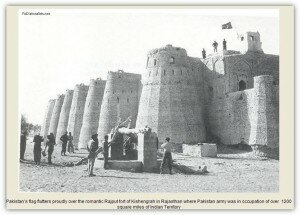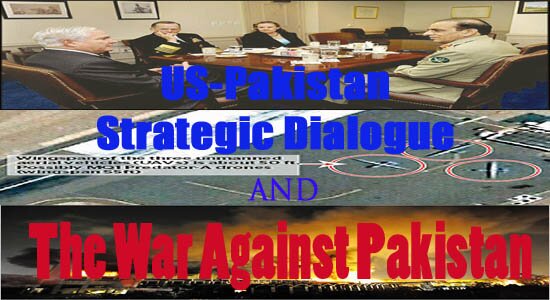 Print This Post
Print This Post  Email This Post
Email This Post

Pakistan's flag, the Green and the Crescent, flutters above the imposing Rajput fort of Kishengarh, in the Indian state of Rajasthan, where Pakistani forces captured over 1,200 square miles of Indian territory in the initial days of the war.
By AHMED QURAISHI
Wednesday, 8 September 2010.
WWW.PAKNATIONALISTS.COM
ISLAMABAD, Pakistan –Two days ago, demoralized Pakistanis quietly marked the anniversary of the 6 September 1965 war with India, which broke out when a bully government in New Delhi tried to invade the smaller neighbor to its west. There is a reason why we mark it as Pakistan Defense Day.
India failed. Pakistanis put up a heroic resistance. Highlights include the world’s largest tank battle after WWII and what then was a new memorable chapter in the world air combat history. Even the nascent Pakistan Navy excelled under pressure. Pakistani naval ships mounted attacks deep inside Indian territorial waters despite being outgunned and outnumbered at sea. At one point, Pakistani naval ships surrounded an Indian battle group as it docked at a port and kept attacking it to lure it into a battle in the open. The Indian battle group avoided engagement and stayed put throughout the war.
Lessons from that war are as valid today as they were 45 years ago. Let’s not forget them:
1. India Is An Enemy
Some of India’s apologists in the Am-Brit media accuse Pakistan of ‘obsessing’ about India and portray India as a victim of Pakistani and Kashmiri ‘terrorism’. But way before the age of terrorism and before the various Kashmiri freedom groups, or ‘lashkars’, even existed, India made sure not miss any opportunity to show hostility toward Pakistan. The experiences of 1965 and 1971 wars proved India will seize every possible opportunity to harm Pakistan.
India faced no threat from Pakistan in the 1960s and ‘70s when it worked with the Soviets and their proxy regime in Kabul to recruit, organize and export terror to Pakistani cities from Afghan soil. And again after 2002, New Delhi did not miss a heartbeat in repeating history in Afghanistan – this time with a quiet nod from CIA. So instead of cooperating with Pakistan in eradicating terrorism and extremism from the region, the Indians chose a short term goal of creating a thorn on Pakistan’s Afghan side.
Pakistan is an Indian obsession. The entire Indian political, diplomatic and military posture is geared toward confronting Pakistan.
India’s two-faced policy was at clearest after the devastating floods in Pakistan. Publicly, India offered financial assistance to the Pakistani government today to deal with a natural disaster. But behind closed doors Indian diplomats were pulling every possible string in Washington and inside the World Bank to block funding for much needed dams in Pakistan. While Islamabad graciously – or foolishly – allowed India to construct major dams on disputed Kashmiri rivers flowing into Pakistan during the past decade, New Delhi is determined to block the construction of dams in the Pakistani side of Kashmir.
But the best example yet of India’s Pakistan obsession is the 1971 war. A couple of years after the 1965 war, India started recruiting, training and arming Pakistanis from East Pakistan, exploiting a disgruntled population in what was then East Pakistan that was angry because of failed nation-building. When conditions matured in 1971, India launched a full-fledged, unprovoked invasion of Pakistan while Pakistanis were busy after a messy election. A proxy terror militia joined the Indian military and intelligence in spreading mayhem across East Pakistan. India benefited from Pakistani unpreparedness [a symbolic Pakistani military presence in East Pakistan was no match to a determined enemy].
It is important to highlight this: India unilaterally invaded Pakistan when Pakistanis were busy in noisy election squabbles. There were no tensions between the two countries. Kashmiris were not bloodying the nose of the Indian military on a daily basis. There was no Lashkar-e-Tayyiba [LeT]. Pakistan was yet to be accused by any Indian of meddling in India or supporting any one of the 14 or so separatist insurgencies that wrack half of India today. To Pakistanis, there can’t be a better example of Indian ill will toward them than this.
The list is long, but two more brief examples suffice:
During Pervez Musharraf’s government, India exploited peace talks with Pakistan between 2004 and 2008 to build scores of dams and water-diversion structures on Kashmiri rivers that feed Pakistan. Simultaneously, India also used peace talks to extract other cultural and economic concessions without moving an inch forward in resolving any one of the major territorial disputes. Unfortunately, Mr. Musharraf, who was Pakistan’s undisputed ruler then, allowed New Delhi to get away with the most in the hope that New Delhi would reciprocate by accepting his new ideas on Kashmir and help him emerge as an international man of peace who succeeded in resolved the perennial Kashmir dispute.
And due to inaction by apologetic and weak Pakistani politicians and rulers, India today is probably the biggest jailer of Pakistanis in the world, mostly innocent visitors or peasants who trespass international border. Pakistani inmates are certain to come out of Indian jails in only two conditions: dead or with severe mental conditions because of torture and mistreatment. It is a rarity for Pakistanis to be released from Indian jails alive or without permanent mental illnesses.
2. US Is An Untrustworthy Friend
Washington may not be the enemy, not yet at least, although it has close on several occasions in the last eight years. Whatever the final assessment, it certainly is not a trustworthy friend. Official Washington knows that Pakistan will never again be as strong an ally of Washington as it was during the Cold War and yet was ditched on several occasions causing damage to Pakistani interests.
During the 1965 war with India, Pakistan was squarely abandoned by US despite being active in two US-sponsored regional security alliances: CENTO and SEATO. Washington not only refused to help Pakistan in 1965 and 1971, it also refused to supply weapons to Pakistan and some members of the then US government tilted toward Soviet-ally India.
The United States proved its untrustworthiness again in Afghanistan after 2002. It refused to pay heed to its Pakistani ally’s legitimate security and strategic concerns; it turned Afghanistan into a magnet for every anti-Pakistan party in the region, and it raised India’s military and political profile in the region, at times deliberately at Pakistan’s expense. During the same period, mainstream US media unleashed the most aggressive anti-Pakistan media campaign ever, and on several occasions Washington meddled in Pakistani politics to create mercenary governments in Islamabad tasked with quietly abolishing Pakistan’s effective military-intelligence capabilities.
Time and again, Washington has shown that it won’t hesitate to pursue policies that clearly harm Pakistani interest.
Despite Pakistan’s crucial support in Afghanistan, Washington continues to refuse to grant Pakistan preferable trade concessions and is known to have urged its European allies to do the same in order to leverage Pakistani military and foreign policy concessions.
It is important here to underline that there is no conflict of interest or values between the Pakistani and American peoples. Both are God-fearing nations that want to live in peace and make a better world. But the actions of US governments over time show it would be foolish for any Pakistani government to trust the United States.
3. Cherish Our Friends
Pakistan’s friends are those who came to our help in 1965 and 1971. It is Saudi Arabia, Iran, China, Indonesia, UAE, Jordan, and several other nations, in Europe and Asia, which came to Pakistan’s help when it really counted.
Iran proved in 1965 that it is a strategic depth for Pakistan. The sectarian angle [Shia/Sunni] never played a role in the relationship. Shia-majority Iran, so to speak, was the first country in the world to recognize and offer direct support to Pakistan Independence Movement and later accord diplomatic recognition to independent Pakistan. Unfortunately, an inexperienced government in Tehran after 1979, bent on meddling in neighboring countries by ‘exporting’ the revolution, created an unnecessary tension in the Pakistani-Iranian relationship [and also in Iran’s relations with its other neighbors]. Compare that to the past. Since 1947 and until 1979, Iran and Pakistan enjoyed a natural strong bond. The ‘revolution export’ project alarmed Pakistan and Iran’s other neighboring nations pushed them into buying American recipes for containing Iran. The revolution ‘export’ project ended after 1990 as Iran’s revolution matured, but the legacy left a permanent mark. At times, Iran played on Pakistani insecurities by cozying up to India. Islamabad on its part blundered by going along with US policies on Iran without respecting the deep-seated and centuries-old Pak-Iranian relations. Iran’s support to Pakistan in the 1965 war offers Pakistanis a lesson: To cultivate and strengthen relations with the people of Iran regardless of the type of government in Tehran. This should be a strategic priority for Pakistani governments and policymakers.
China, in a spectacular show of support, moved its army to the border with Pakistan during the 1965 war, sending shockwaves through New Delhi, which was still smarting from a defeat at the hands of the formidable People’s Liberation Army in 1962. Again, after the installation of a US proxy government in Islamabad in April 2008, some key figures in that government tried to damage Sino-Pakistani relations. Also in 2008 Beijing remained without a Pakistani ambassador for months, creating an unfortunate precedence in the bilateral ties between close allies. Unfortunately, even during China-friendly governments in Islamabad, Pakistan has failed to take its relations with China to the next levels. There are hardly any Chinese language experts in the Pakistani government, no emphasis on teaching Chinese language in Pakistani universities, no joint cultural programs, and not even an exchange program for pop and rock stars from both nations to link the younger generation. Since Pakistani political parties lack visionary leaders, the Sino-Pakistani relationship suffers inexplicable negligence from the Pakistani side. This runs counter to the lessons from the 1965 war.
Saudi Arabia, like China and Iran, almost joined the war on the side of Pakistan in 1965. And like China, Riyadh was shunned by the new pro-US government in Islamabad in 2008. For the first time, a Saudi ambassador was refused a farewell meeting by the Pakistani president in 2009, again creating an unfortunate precedence between two close allies. During relief operations, the Saudi ambassador was quoted by Pakistani reporters as saying he was disappointed the Pakistani government and media chose to highlight US aid when his country was the first responder and the most generous one, aside from 23 US helicopters and cargo planes.
Indonesia sent submarines to Karachi and missile boats to Dhaka to break the Indian sea blockade of the two vital Pakistani cities. Indonesian battle ships joined Pakistan Navy fleet under the Pakistani Green and Crescent, effectively taking part in resisting the Indian invasion. Indonesia’s politican and military leaderships showed courage and commitment toward their brothers and friends in Pakistan.
The bottom line is this: The 1965 and 1971 wars provide Pakistan excellent primers on how to define a robust foreign policy and leverage weaknesses. These lessons should be heeded and should guide any Pakistani nationalist government that might ascend power in Islamabad in future.
Mr. Quraishi wrote this paper for Project Pakistan 21 [Project For Pakistan In 21st Century], an independent think tank based in Islamabad.
© 2007-2010. All rights reserved. PakNationalists.com
Verbatim copying and distribution of this entire article is permitted in any medium
without royalty provided this notice is preserved.







[...] This post was mentioned on Twitter by talha mujaddidi, Ahmed Quraishi. Ahmed Quraishi said: Beware of your enemy, know your unreliable allies, and stick to your friends. http://fb.me/xcghXCbf [...]